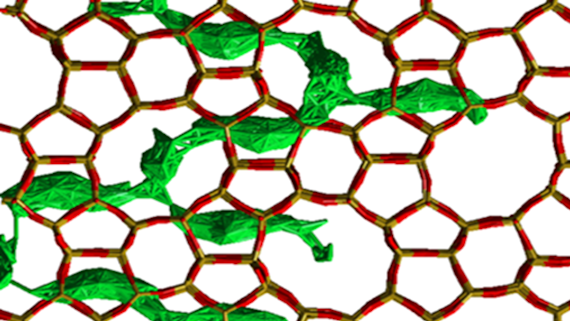Ramsay Memorial Fellowship awarded for porous materials research
24 Mawrth 2017

Dr Alexander O’Malley, postdoctoral research associate at the School of Chemistry, has been awarded the prestigious Ramsay Memorial Fellowship for Chemical Science. His project ‘Understanding nanoscale molecular mobility in microporous materials for public health applications' will begin in July based at the UK Catalysis Hub.
Dr O’Malley’s research focuses on the behaviour of molecules inside zeolites. Zeolites are a set of porous solids which form naturally, and can also be designed and synthesised with ordered pores and channels inside them that are the same dimensions of small molecules. These self-assembly processes are not fully understood, however these pores make zeolites incredibly useful for performing chemical reactions inside them (catalysis), separating mixtures at a molecular level (molecular sieving) and for releasing molecules when we want them too (controlled release).
During the 2-year fellowship, Dr O’Malley will study these three different applications with zeolites using a combination of neutron scattering (predominantly performed at the ISIS neutron source, Oxfordshire) and molecular simulations, which can measure how fast the molecules are moving and decipher the mechanisms they diffuse by. The first study is based around NOx abatement, which involves converting poisonous NOx gases from car exhausts to nitrogen and water using a zeolite called Chabazite in automotive catalytic converters.
The second part will look at the removal of toxic arsenic compounds from water using molecular sieving with a zeolite called Clinopltilolite. This project will be carried out in collaboration with Kwame Nkrumah University of Science and Technology in Ghana, where arsenic compounds can be found in several reservoirs and can be dangerous to community health.
The third part of the project will investigate the controlled release of medicines through the zeolite Faujasite, specifically how the drug Atenolol, a beta-blocker primarily used to treat angina and hypertension, can be administered using a zeolite skin patch over the course of a few days, rather than the current method of oral dosage which has a number of undesirable side effects.
The Ramsay Memorial Fellowships were established in 1920 as a memorial to Sir William Ramsay, a Nobel Prize winning chemist who discovered argon, helium, neon, krypton, and xenon. The Ramsay Fellowships are awarded annually to postdoctoral chemists in the early stages of their career, enabling them to conduct original and independent research at universities in the United Kingdom. Ramsay Fellows typically continue to work in the chemistry field after their Fellowships have ended. Many have become Professors of Chemistry; others have gone on to occupy responsible positions in industry and public service.
Dr O’Malley commented: "I'm absolutely delighted to accept the Ramsay Memorial Fellowship and perform my research as part of the Cardiff Catalysis Institute, and the UK Catalysis Hub. The many world class researchers here both established and emerging in the field of zeolite science will ensure the greatest possible success for the project. I'm sure we will do these very special materials, and the important applications for which we hope to use them justice.
I hope this fellowship will be a springboard to a long career in academia with tight industrial links, studying these fascinating materials which have so much potential to assist in a number of the struggles we face. Be it fossil fuel depletion, sustainable synthesis of the chemicals we need or helping in our attempts to protect the environment."
To find out more about the Fellowships, please visit the Ramsay Memorial Fellowships Trust website.